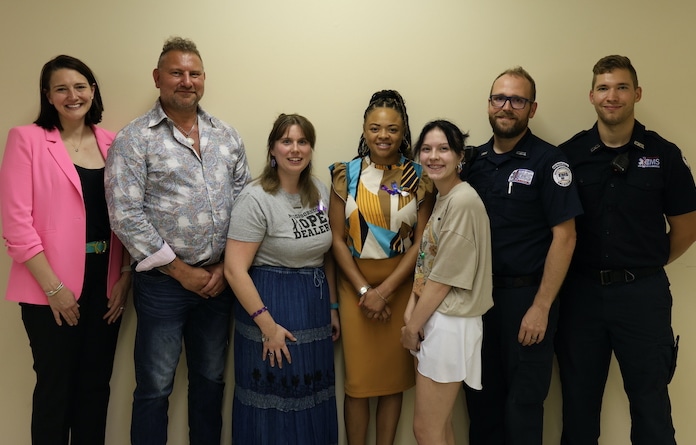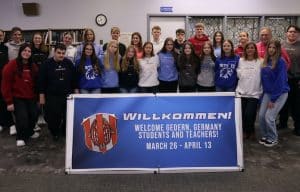Thinking straight

Waterloo Listens and Human Support Services hosted a gathering at St. Paul United Church of Christ in Waterloo on Thursday in observance of International Overdose Awareness Day.
The overdose awareness campaign began back in 2001 and is recognized each year on Aug. 31, and Waterloo Listens hosted its first event in recognition of the day last year.
This year’s event, much like last year, featured speakers from HSS and other local groups describing the impact of drug and alcohol addiction, with several individuals sharing their own experiences involving substance abuse and overdoses.
Among these speakers was HSS Vice President of Behavioral Health Services Stephanie Moore, who expressed the importance of support from community services and those close to someone suffering from addiction.
“Without support, a lot of things go unseen, and when we get rid of our preconceived notions sometimes then it opens up the door to us being able to support each other in a more holistic measure,” Moore said.
Another to speak was Dr. Carrie Mintz, a psychiatrist with Harris House in St. Louis who focuses on addiction, doing both clinical work and research focused on identifying gaps in care.
Mintz spoke about the need in her work to address the issues that existed before an individual began dealing specifically with illness. After a period of sobriety, she said it’s important to address the “co-occurring illnesses” that might have driven that addiction to begin with.
She also noted, as most every speaker at the event did, the stigma surrounding addiction. Mintz stressed the harm of this stigma, particularly as she expressed the fact addiction is an incredibly difficult illness for someone to face.
“This is truly a brain disease,” Mintz said. “The brain is the most complicated, most sophisticated organ in our body. We have billions of neurons, and so when that goes awry, that’s gonna be complicated to try to fix, so it’s, perhaps, not surprising that we don’t yet have an insulin like we do for diabetes or a beta blocker like we do if someone has a fast heart rate.”
Nick Hoeffken and Dan Bemenderfer with Monroe County EMS were also present to discuss some the calls that they regularly respond to concerning addiction and overdose.
Hoeffken said the department has responded to 43 total cases involving substance abuse in the last year, with some pertaining to alcohol poisoning and others being drug overdoses.
Ten of these calls involved responding personnel using Narcan, a form of naloxone which is used to reverse the effects of an opioid overdose as the patient is transported to the hospital.
While Hoeffken and Bemenderfer explained that EMS use different forms of Narcan, a single-dose nasal spray is widely available over the counter at most pharmacies.
They and several other speakers encouraged folks to get a dosage to carry themselves as the drug can be vital for those suffering overdose symptoms.
Another individual to speak was Dr. Christopher Schenewerk, who described in-depth his own battle with alcohol addiction.
“It’s a disease of the mind, and it is tricky. It is strategic, and it will take you over,” Schenewerk said.
He explained that he occasionally drank in high school, though that was almost entirely stopped during college as he pursued his medical education.
Along with various other stressors, a breaking point in his life came as he dealt with a divorce and turned to alcohol to “start his own reality.”
As Schenewerk described, he spent the next decade dealing with his addiction, incapable of finding a way to address his illness even as he was able to point others to treatment for their addiction.
“Even as a doctor, a family practice doctor that sometimes addicts would come in looking for help, I could tell them what to do, but I couldn’t look in the mirror and tell myself what to do,” Schenewerk said. “That is the insanity of the disease. I have no fighting power against this disease, none. And no other addict does.”
Schenewerk was eventually able to find the care he needed. Like Moore, he stressed the importance of support from outside as it was thanks to community he was able to address his addiction.
“We have to do this as a team,” Schenewerk said. “With tragedy comes bluer skies. In the darkness, somewhere there’s light. And what we have to do is we have to be the light, because there are too many in our community, in the world, that are in the darkness, and we can’t have that. We gotta work together.”
Along these lines, he encouraged the audience to recognize that alcoholism and addiction are everywhere in the community, further imploring those who don’t suffer from addiction to come to an Alcoholics Anonymous meeting in order to better recommend them to any friends or family who might need help facing their illness.
Schenewerk specifically noted the impact that The Three Amigos, an AA group he and several friends formed, has had on him.
A number of other individuals also spoke about their experiences with addiction.
One individual to speak discussed her experience losing a family member to an overdose, noting the shame and embarrassment that is often associated with addiction.
Another person to speak described her own battle with alcohol addiction, including an interaction or two she had with local EMS.
One of the most potent stories came from Bo McCoy, a student at Waterloo High School who attempted to overdose on their medication earlier this year.
McCoy recalled being in their car one day, having drama club rehearsal and swallowing nearly an entire bottle of pills.
“Leading up to this, I wasn’t showering, I wasn’t eating, I wasn’t sleeping, and I was running on drugs,” McCoy said. “I just was not taking care of myself. I wasn’t doing well in school. I was failing some classes, I believe… But I got the help I needed, and I went to the hospital.”
McCoy expressed great thanks for former Waterloo School Resource Officer Shaun Wiegand, who approached the car in the parking lot and was able to get help which brought McCoy to the hospital.
What followed was a brief stint in the hospital as McCoy recovered from the overdose, later moving to counseling, therapy and other care.
“Seeing my parents for the first time after I got out of the hospital was just… I’m so happy to be home, and I never wanted to go through that again,” McCoy said. “I’m so happy to be alive, and I cannot thank everybody more for being here today and listening to my story.”
Following McCoy’s story, their family and friend in the audience shared plenty of hugs and tears, further reinforcing one of the points they had made in their speech.
“Make sure to check up on your friends that you don’t know how they’re doing, because they may need you,” McCoy said. “But also remember there is sunshine at the end of the dark road, and surviving is worth it.”
As previously mentioned, this and last year’s event was organized by Waterloo Listens, with the initial idea coming largely from Amanda Schweigert, who works as a counselor in St. Louis.
She spoke about her work at the event, expanding on it following the meeting.
Addiction, Schweigert explained, became a key focus for her as she pursued a counseling career in large part because of how it intersects with trauma, eating disorders and other issues.
The impetus for organizing an International Overdose Awareness Day event came as she heard about the campaign while assisting in the development of Cornerstone Laine, a women’s recovery residence which was proposed some time ago off Route 3 in Waterloo.
Schweigert said that, given Waterloo Listens’ activist interests, a big reason to organize such an event was the extreme stigma and negative perception of addiction.
Last year also saw a substantial number of overdose deaths occur across the country, further demonstrating the need to discuss the issue locally, as Schweigert said.
Schweigert expressed satisfaction with both last year’s and this year’s events, saying that another gathering next year could take place depending on community interest and need.
“I hope that recognizing that this is something painful that loved ones go through or people that have survived different types of overdoses, I hope it helps to destigmatize substance abuse and addiction,” Schweigert said. “Whether it is a temporary misusing of substances or a long-term addiction problem, there are lots of different elements and lots of different risk factors that lead somebody to that point in their life. Something that I talk about with clients and I hear clients say is none of them as children thought ‘Oh, I hope I’m an addict or an alcoholic when I grow up.’ Nobody wants it. It’s miserable.”
Several coming events were mentioned at the Thursday meeting, including the fifth annual Harris House Run & Walk on Sept. 30. More information can be found at harrishousestl.org.
Also mentioned was the HSS and Monroe County Sheriff’s Department “Mind Over Miles” Run and Walk on Sept. 23. For more information, call 618-939-4444 ext. 1250 or email kking@hss1.org.
Additionally, Three Amigos AA takes place at Life Community Church in Columbia each Friday at 6 p.m.
Related to Three Amigos is As Bill Sees it, an AA group which meets at 6 p.m. on Mondays, and Free & Simple, an NA group which meets at 7 p.m. every Tuesday. Both of these meet at Life Community Church as well.
For more information on these groups, text Schenewerk at 618-304-4696.






